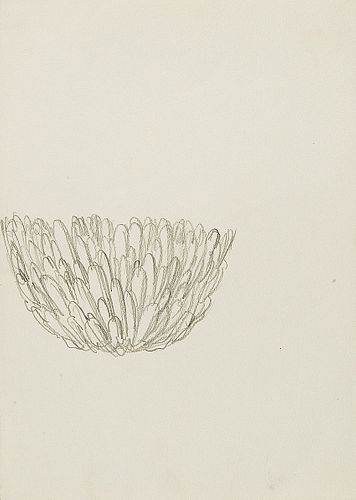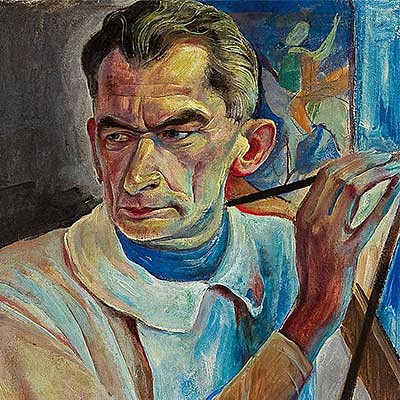JOSEF HOFFMANN* (Pirnitz 1870 - 1956 Vienna)
Lot 26
Estimate:
EUR€300 - EUR€600
$322.58 - $645.16
Absentee vs Live bid
Two ways to bid:
- Leave a max absentee bid and the platform will bid on your behalf up to your maximum bid during the live auction.
- Bid live during the auction and your bids will be submitted real-time to the auctioneer.
Bid Increments
| Price | Bid Increment |
|---|---|
| EUR€0 | EUR€10 |
| EUR€100 | EUR€50 |
| EUR€700 | EUR€100 |
| EUR€1,000 | EUR€200 |
| EUR€3,000 | EUR€300 |
| EUR€3,600 | EUR€400 |
| EUR€4,000 | EUR€500 |
| EUR€7,000 | EUR€1,000 |
| EUR€16,000 | EUR€2,000 |
| EUR€30,000 | EUR€3,000 |
| EUR€36,000 | EUR€4,000 |
| EUR€40,000 | EUR€5,000 |
| EUR€150,000 | EUR€10,000 |
About Auction
By Widder Auctions
Nov 28, 2022
Set Reminder
2022-11-28 10:00:00
2022-11-28 10:00:00
America/New_York
Bidsquare
Bidsquare : Viennese Art Nouveau, Expressionism, Modern Art
https://www.bidsquare.com/auctions/widder-auctions/viennese-art-nouveau-expressionism-modern-art-10414
Widder Auctions office@widderauktionen.com
Widder Auctions office@widderauktionen.com
- Lot Description
JOSEF HOFFMANN*
(Pirnitz 1870 - 1956 Vienna)
Design crystal vase for Lobmeyr, 1954
pencil/paper, 30.3 x 21.7 cm
provenance: Carla Hoffmann, private collection Vienna
ESTIMATE #Euro 300 - 600
STARTING PRICE #Euro 300
Josef Hoffmann, a student of Otto Wagner, was one of the central figures of Viennese Modernism as an architect and designer. In 1903, he founded the Wiener Werkstaette (WW) with Koloman Moser and industrialist Fritz Waerndorfer, modeled on the British Arts and Crafts Movement and influenced by Viennese Art Nouveau. Hoffmann, a friend of Gustav Klimt and Anton Hanak, among others, remained one of the most important designers of the WW until its bankruptcy in 1932. The Wiener Werkstaette, also referred to as Wiener Werkstatt, Vienna Workshop, Wiener Werkstaetten or Wiener Werkstaetten, aimed to unite the entire spheres of human life in design, in the sense of a Gesamtkunstwerk. Its customers were mainly artists and the upwardly mobile Jewish upper and middle classes. Josef Hoffmann's acquaintance with Berta Zuckerkandl led to the first major commission: the Purkersdorf Sanatorium in the west of Vienna, planned by Viktor Zuckerkandl, Berta's brother-in-law. Among WW's employees were about a dozen women who were crucial to the change in style from Art Nouveau to Art Deco in the 1920s, e.g. Vally Wieselthier, Gudrun Baudisch, Reni Schaschl, Hilda Jesser and Susi Singer. In 1823 Josef Lobmeyr Sr. founded his company, which still exists today, in Vienna's Weihburggasse. the company soon became a purveyor to the imperial court. Son Ludwig became the most important protagonist of Austro-Bohemian glass production and presented the company at the first world exhibitions. In 1864, he co-founded the Imperial and Royal Austrian Museum of Art and Industry in Vienna (today: Museum of Applied Arts - MAK). Ludwig's nephew Stefan Rath Sr. led Lobmeyr into modernism and, together with Hoffmann, co-founded the Austrian Werkbund in 1912, of which Josef Hoffmann was a member until 1920. With Josef Hoffmann and the artists of the Wiener Werkstaette, Lobmeyr created classics, drinking glasses and chandeliers during this period, some of which are still produced by Lobmeyr today. The articles were also distributed through the Wiener Werkstaette branches. Josef Hoffmann survived the Nazi period unscathed despite hostility from the Nazi architectural ideologist Paul Schmitthenner. He was commissioned by the Reich Chamber of Fine Arts to further develop the Wiener Kunsthandwerksverein (a Nazi successor organization to the oesterreichischer Werkbund) as its artistic director. To this end, an "artistic experimental institute" was founded in 1941, where young artisans could further their education under Hoffmann's guidance. After World War II, in 1948, Hoffmann founded the oesterreichische Werkstaetten as the successor to the Wiener Werkstaette und Werkbund (oeWB) - and again designed for Lobmeyr. A cut crystal vase like the one shown here was executed by J. & L. Lobmeyer on behalf of the Ministry of Education for the 1954 Triennale. Hoffmann's tombstone was designed by Fritz Wotruba. "
PLEASE NOTE:
The purchase price consists of the highest bid plus the buyer's premium, sales tax and, if applicable, the fee of artists resale rights. In the case of normal taxation (marked #), a premium of 24% is added to the highest bid. The mandatory sales tax of 13%, for photographys 20%, is added to the sum of the highest bid and the buyer's premium. The buyer's premium amounts to 28% in case of differential taxation. The sales tax is included in the differential taxation. - Shipping Info
-
We will send you the invoice shortly after the auction. As soon as we have recieved the amount, the art can be picked up at Johannesgasse 9-13, 1010 Vienna. Please note that the buyer is responsible for pick-up and shipping of the lot. Should you wish to ship your items, please contact: Mailboxes Email: oper@mbe-co.at Tel: 01 5128855 Please note that storage fees may apply, should the pieces not be picked up within 14 days after invoicing for domestic and 28 days for international transportation. Our team will be happy to assist you with any further information at office@widderauktionen.com or at 0043 676 555 66 10.
-
- Buyer's Premium



 EUR
EUR CAD
CAD AUD
AUD GBP
GBP MXN
MXN HKD
HKD CNY
CNY MYR
MYR SEK
SEK SGD
SGD CHF
CHF THB
THB











